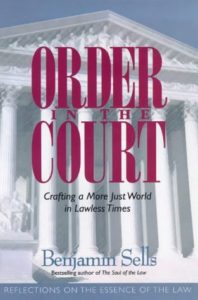
Each year the volumes of laws, rules and regulations effected by lawmakers grow thicker and more intrusive. Lawsuits continue to skyrocket as people replace discourse with depositions and leaders set aside debate and compromise in favor of litigation and subpoenas. Author Benjamin Sells believes we are living in a lawless time. Although we are faced with rules and codes of conduct every day, the essence and soul has been stripped from the law. Order in the Court suggests ways to temper a system in which it seems that whomever has the most power and money wins rather than providing “liberty and justice for all.” Law is necessary in a society that wants to avoid chaos. And Order in the Court provides a blueprint for what the law, those that practice the law and those that obey the law can aspire to.
Publisher’s Weekly Review
With the law so conspicuously and ignominiously in the news as lawyers argue over what does and does not constitute perjury, high crimes and misdemeanors, Sells (The Soul of the Law), a psychotherapist and former practicing attorney, offers an unorthodox look at the legal profession by drawing on his casework as a therapist. Taking a high-minded view, he believes that the lawyerly life should be “a life of service on behalf of soul,” a calling dedicated to building a more just society. Several of the 52 short, conversational essays elaborate on that message and show how the reality of lawyering rarely lives up to the noble ideal. Many of Sells’s patients are attorneys who suffer from depression, overwork, feelings of emptiness or an inability to sustain personal relationships. One cause underlying their misery, Sells suggests, may be lawyering itself, with its adversarial, truth-bending, competitive, guarded habits. In one marvelous piece, “The Good, the Bad, and the Ugly,” Sells forthrightly profiles “some of the lawyers I have known who should not be lawyers.” Another essay mocks impersonal business-world jargon (which he calls “deadspeak”); other topics include the lost art of listening, judges’ social and professional isolation, lawyer-client relationships, secretaries and the illusory wisdom of hindsight. Although he offers few concrete proposals on how to “ensoul” the legal world, Sells does give readers a refreshing and refreshingly nonlegalistic take on the legal profession.
See our Contact page.